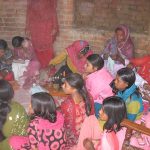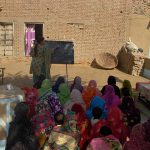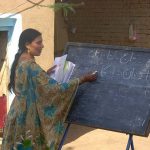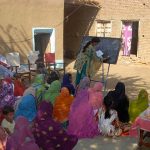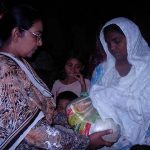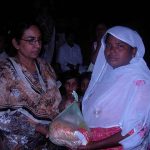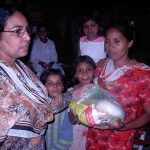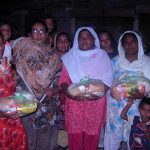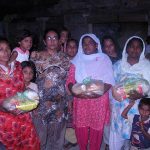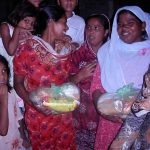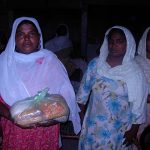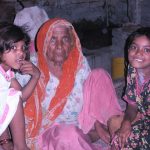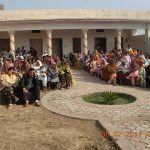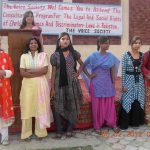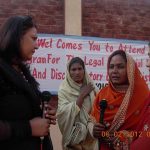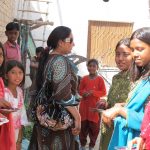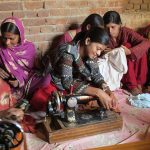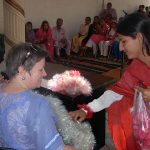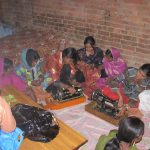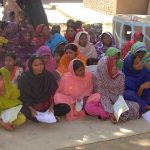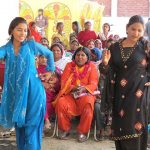The Voice felt the need to work for such poor and persecuted women because we are working in such a society where every day this kind of incidence happens and there are not enough people to help these victims without harassment and indignity. As you know our society is a men dominant society and it is hard for the women to survive in this society without skills, money and sources and therefore they are more vulnerable towards further exploitation.
As it is stated before that woman is the most persecuted group in our society, therefore there is a strong need to work for the welfare and development of these women. The voice started operating in 2009 by primarily helping victims of religious victimizations, prisoners of conscience and other oppression. The voice is providing help in collecting required material from different law enforcing agencies in support or defense of their respective cases, help to lodge criminal and civil complaints and in arranging lawyers to conduct their cases in the courts.
“We are hard-pressed on every side, yet not crushed; we are perplexed, but not in despair; persecuted, but not forsaken; struck down, but not destroyed” (2 Corinthians 4:8-9).
Women Empowerment Program
Introduction:
The Voice has been set-up by ordinary people to do extra-ordinary task with their limited resources. “Defend the cause of the weak and fatherless; maintain the right of the poor and oppressed”,
The Voice is a non-political, non-governmental and non-profit organization. Its motto is, “help those who are not able to help themselves.”
Background of the Voice:
The voice is working for the rights of the Women providing them free legal Aid and help in the cases of Rape, Domestic Violence, Forced Conversion, Bonded Labour etc.
Moreover The Voice is also helping the Brick kiln bonded labours in general by relieving them from the bondage and providing them opportunities or connecting them with people that can finance them directly for any Micro-business opportunity.
History behind the motive (Project for women):
The country has been subjected to martial law rule at four different occasions during its history for a period of almost three-quarters of its entire existence since 1947. During the second last martial law rule of eleven years, General Zia-ul-Haq allowed the orthodox fundamentalist religions leaders (Ulema /Maulvis) to enjoy political, economic and social clout and gains in order to obtain religions legitimating for his illegitimate rule. The result of this cynical use of conservative religious leaders was the spread of fundamentalism and obscurantism at a very foundational level in the society. During this period oppressive and discriminatory pieces of so- called Islamic legislation were introduced against religious minorities and women. These include the Hadood Ordinance Laws relating to Zakat and Ushr, the Qisas and Diyat Law, the Qanoon-e-Shahadat (Law of Evidence) and finally the most draconian of all laws, the “Blasphemy Law” or Pakistan Penal Code 295-C.
All these pieces of sectarian legislation have promoted an atmosphere of intolerance in the country, which not only encourages sentiments of religious prejudice and bigotry against non-Muslim citizen but also poses a serious threat to basic human rights of citizens in general and thus jeopardizes the whole process of democratization.
With the influence of Sharia laws and Islamic system the women became the most vulnerable part of the country that could be subjected to violence and infringement of rights very easily.
Social Status of Women in Pakistan:
Gender segregation and restrictions on the mobility of women (to the extent that women are an invisible entity in public in many parts of the country) is an ugly feature of community profile in Pakistan. Gender segregation is a powerful factor in the denial of basic human rights to women such as realization of their human potential, participation in the enjoyment of life in general and availing upon whatever economic and political opportunities do exist in a country like Pakistan.
Gender segregation in the rural and urban communities follows a convenient path as in most of the social systems that become emaciated due to lack of institutional capacity for evolutionary growth. Men and families can operate among parameters of religious injunctions, provisions of common law and customary practices as long as it benefits them and maintains essential male supremacy. Men allow their women to come out of Purdah (to cover the face with veil) when pressed for economic reasons but ensure that such flexibility does not extend to the domains such as education, independent employment and recreation, which may result in genuine female emancipation.
Trade and trafficking in women are a barely concealed reality of rural communities but usually overlooked by the custodians of public morality. In some parts of the country, a village Mullah (Muslim clergyman) is often a willing abettor in this violation of human dignity provided the whole activity is couched in appropriately religious diction. Kidnapping a woman to contract a marriage without the permission of her parents, to seek revenge from the women’s family, to sell the women or simply to fulfil carnal designs is a widely practiced injustice in many parts of the country.
Dissolution of a contract (martial in this case), which fails to satisfy either party, is a basic human right. However, in the existing socio-economic structures of poor communities in Pakistan, divorce is invariably catastrophic for a woman who was earlier denied the right to education, employment and the basic training to become a proactive member of society. She was perceived as fit only to look after the household of her husband, beget and rear his children. Under these circumstances, divorce renders a woman thoroughly marginalized with a social stigma attached to her name.
The status of women Pakistan is marked by lack of institutional economic opportunities for women. All other aspects of their social and domestic subjugation either stem from their lack of accessibility to economic independence or are reinforced by their economic vulnerability. Most of the women who work was either not paid for their labour or receive considerably fewer wages than received by a man for equal amount of labour. Their work is considered just a contribution to the responsibility of their men.
Violence against Women
Violence against women is another ugly reality in Pakistan and assumes multiple forms. Violence against women occurs at all levels of society and has diverse forms. It ranges from more covert acts (e.g. abusive language, and coercion in marriage) and goes on to include the more explicit forms of violence (wife-beating, torture, marital rape, custodial violence, honour killings, burning of women, acid throwing, mutilation, incest, gang rape, public stripping of women, trafficking and forced prostitution, and sexual harassment in the street and workplace, etc.) Violence against women is not an easy issue to deal with. Many forms of it are so entrenched in our culture that they are ignored, condoned or not even recognized as violence by the large sections of our society.
Domestic Violence
Wife abuse is a fairly common phenomenon in Pakistan. It can take the form of slapping, beating, torture, mutilation and murder. Society views abuse of a wife as a private, internal family matter, which cannot and should not be interfered with, almost as though a wife were a property of the husband to do with as he wishes. Domestic abuse is, therefore, seldom recognized as a crime socially unless it takes an extreme form.
Sexual Harassment
Sexual harassment in the workplace and elsewhere is fairly widespread in Pakistan. Incidents of public humiliation and violence, including acid throwing, public stripping, are part of the accelerating violence against women. There is a general perception in Pakistan that Christians represent west and since in Western culture women do not object to having sex before marriage and having friendship with men. This misconception makes Christian women more vulnerable to sexual harassment.
Rape and Sexual Assault
Rape or forcible sexual intercourse is one of the most horrendous forms of violence against women and girls. Rape for a woman does not end with the act itself. Rape victims often suffer a form of post-traumatic stress disorder, particularly those who have also suffered extreme threats, terror and helplessness. Christians being economically poor and with no social or political power are open to this sort of violence and the Muslim male can easily get away with this crime without being punished for it. The accused are supported by the Law and State itself.
If a rape is committed to a Muslim woman, according to the Islamic Law; to prove her rape in the court she had to produce two male Muslims who are truthful persons and abstain from major sins. And a non-Muslim woman need four male Muslim witnesses to prove her rape, if she fails to produce the witnesses she instead is charged for making false allegations. The punishments for these charges are 80 whipping and 50 thousand fine. These laws have legitimized the victimization of women rather than the protection.
In almost all the rape cases the whole family of the girl is forced to leave their house and go in hiding. Sometimes, the family in such circumstances forsakes the survivor of sexual abuse.
Religious Conversations/ Forced Conversions
The rapid religious elements have assumed upon themselves the responsibility to take care of the religious rectitude of the citizenry. They seem to genuinely believe that those not subscribing to their version of faith has either gone astray or they entertain criminal credentials. A mass scale conversion of the religious minorities to the majority religion is the fantasy and standing agenda of these bigoted souls. Christian girls who are forcibly converted to Islam and taken into marriage could never come back to their parents. If a girl manages to escape her family and the entire Christian community living in that area comes under attack by the Muslim majority. In such circumstances it becomes essential for the girl to seek refuge elsewhere.
Reasons for working upon this issue as a Project
The Voice felt the need to work for such poor and persecuted women because the Voice have women in the Board as a Majority and we felt the need of helping poor, persecuted Sisters in Christ. secondly we are working in such a society where every day this kind of incidence happens and there are not enough people to help these victims without harassment and indignity especially if they go in the chambers of the Male lawyers. As you know our society is a men dominant society and it is hard for the women to survive in this society with out skills, money and sources and therefore they are more vulnerable towards further exploitation. Thirdly because of our practice as a lawyers there are a lot of poor and needy women as our clients that expect us to help them with out taking any money, we can do that in our practice but we can not make up to their court expenses and other expenses involved in their cases e.g. travelling, medical etc. some times they are in such a condition that we have to admit them in the hospital these all activities involve finances that we do not have. That’s why we decided to start it as a project so that we could help the needy and oppressed women in a proper and better way.
Strategy for the Project for women
As this project involves a legal work and the work regarding women therefore the people working for this project are all women. It is decided by the general board of Directors of the voice that only women will lead this project. Secondly we have started programs for the empowerment and uplift of the women in various areas especially sub-urban and rural areas of Punjab so that women may get basic technical skills of stitching, sewing, knitting, Adult Education and beauty artists etc. with this program hundreds of women have obtained benefits and hundreds are getting the training so that they may survive in the society with dignity and self -respect.

